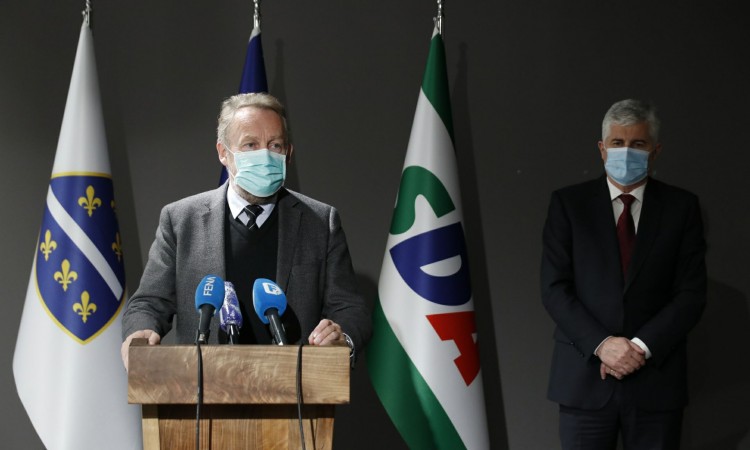
Bakir Izetbegovic, the leader of the main Bosniak SDA party, dismissed the allegations about being in negotiations on establishing a third entity through talks on electoral legislation reform with representatives of the main Croat HDZ BiH party.
“We are trying to harmonise two principles that this country is grounded on and the way it is functioning – the civil and ethnic principles,” Izetbegovic said Wednesday evening, following a meeting with HDZ BiH leader Dragan Covic.
The essence of the talks is making an arrangement on how to make decisions “when we act as citizens or when we act as peoples,” Izetbegovic added, noting that many types of discrimination are present in the rules concerning election legislation.
“There is a discrimination in BiH that concerns minorities, there is one – as the HDZ BiH claims – towards one people to whom others elect representatives, and there is also discrimination regarding the majority. Here, in the Federation the majority is unable to form authorities because they are a minority in the Parliament, not a minority as a people,” he added.
Bosnia and Herzegovina is divided into two semi-autonomous regions, the Bosniak-Croat shared Federation (FBiH) and the Serb-majority Republika Srpska (RS), with all three major ethnic groups and two entities being represented in the central government at the state level.
Electoral legislation has been a burning issue for years, ever since the European Court of Human Rights (ECHR) ruled in 2009 that BiH must allow the minorities the right to run for certain posts, and later in 2016 when Bosnia's Constitutional Court ruled in favour of a Croat politician who complained about the law provision dictating that cantons delegate at least one representative from each of the country’s three main ethnic groups to the upper chamber of the Federation (FBiH), the semi-autonomous entity in the country shared mostly between Bosniaks and Croats.
What the Croat politicians demand is ensuring that their representatives in authority cannot be elected by the people of different ethnic groups, while the Bosniak politicians say the reform should also include the changes to the Constitution.
During the meeting they held on Wednesday, the political representatives of the two parties seemed to move their stances on this matter closer.
According to Izetbegovic, the HDZ BiH realised the progress won't be possible without minor constitutional changes. As for the formation of government in the FBiH, which remains unsolved since the 2018 elections, the SDA leader said they would try to negotiate a solution that considers a new structure or the SDA will insist on the new Government with two ministers whose posts are vacant at the moment.
“Without having that arranged it will be hard to resume the talks,” he added.
Speaking to media after the Wednesday meeting, the HDZ BiH leader said he was on the same page with Izetbegovic and that they agreed on the necessity to improve the relations at the FBiH level. New talks will follow in a week, he announced.
As for the Election Law reform, Covic said he was glad they were trying hard to find a solution together.
“The SDA's stance that one people won't elect representatives to others means to me a lot. Of course, we must harmonise that with the decisions of the Constitutional Court and the Court in Strasbourg,” stressed Covic, adding that he would say yes if this means certain changes to the Constitution as well.
According to him, other parliamentary parties will join the talks in May already.
Both the Bosniak and Croat as well as the Serb leader held talks with US special envoy for the Western Balkans Matthew Palmer earlier on Wednesday. The official expressed support for “meaningful electoral reform” in BiH, which must include “limited constitutional reform.”
Special Representative Matthew Palmer spoke with BiH House of Peoples First Deputy Speaker @Dragan_Covic today: pic.twitter.com/qT1lNHveVV
— US Embassy Sarajevo (@USEmbassySJJ) March 10, 2021
Special Representative Matthew Palmer spoke with BiH House of Peoples Speaker @BIzetbegovic today: pic.twitter.com/w0vZS2hCQ3
— US Embassy Sarajevo (@USEmbassySJJ) March 10, 2021
Special Representative Matthew Palmer spoke with BiH Presidency Chair Milorad Dodik today: pic.twitter.com/YgqD6fb3So
— US Embassy Sarajevo (@USEmbassySJJ) March 10, 2021





Kakvo je tvoje mišljenje o ovome?
Budi prvi koji će ostaviti komentar!